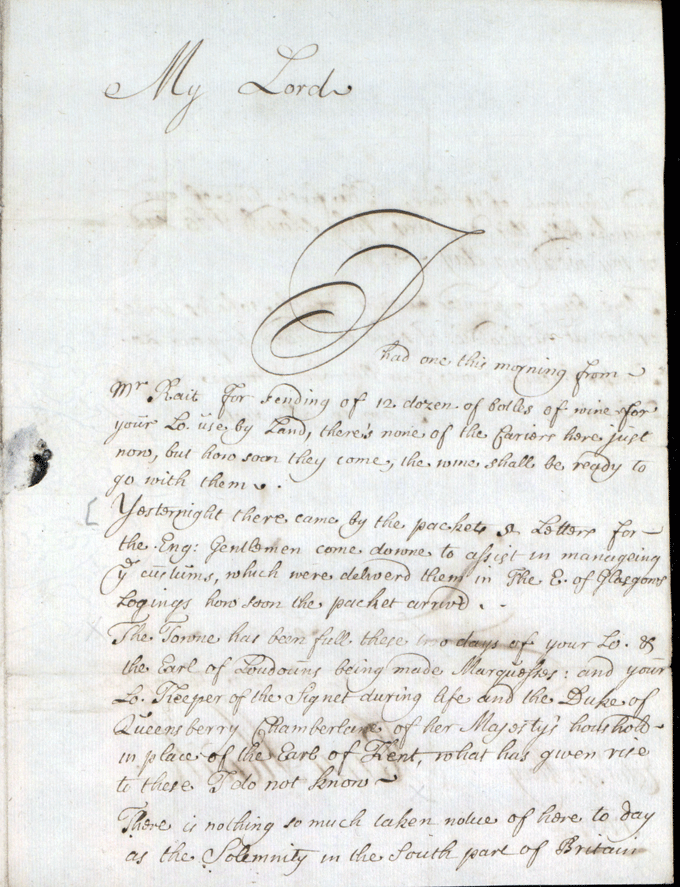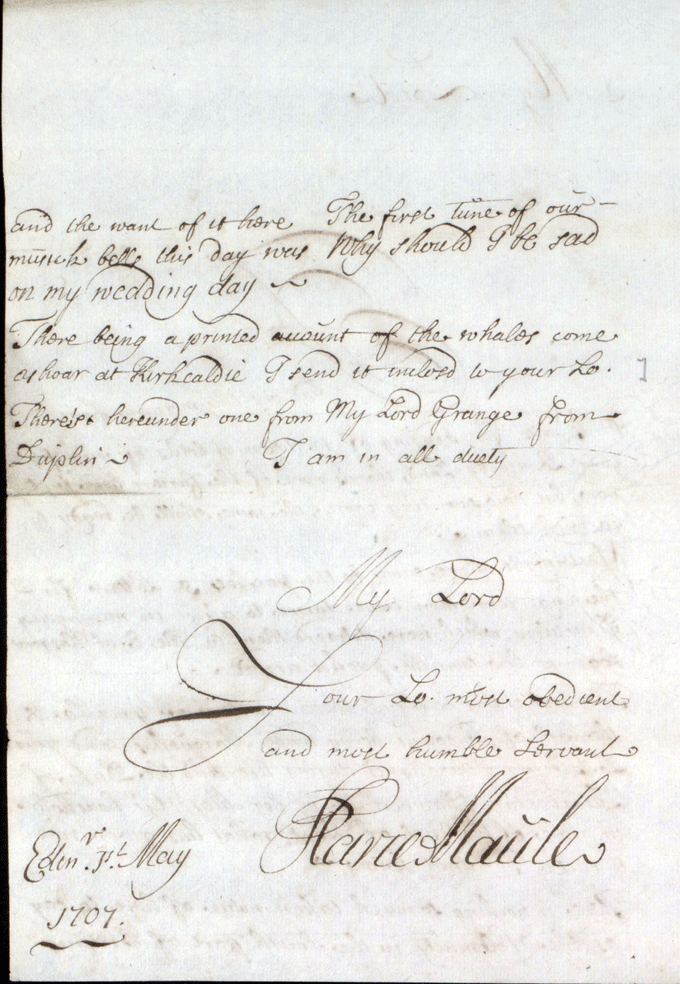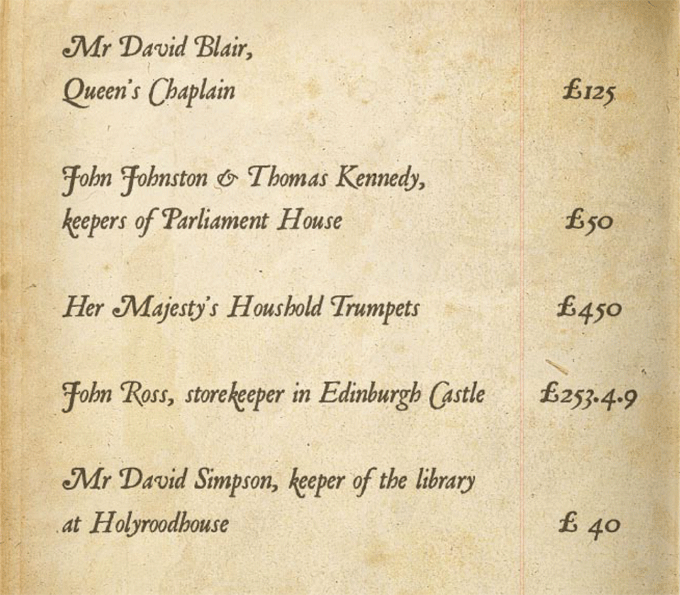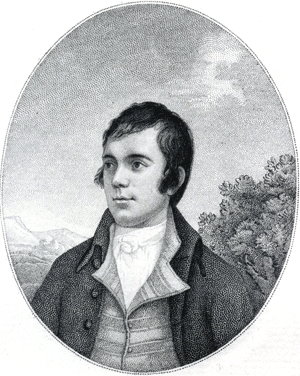| | Home | Resources | Schools Programme | Teachers | Site help | About us | Contact us | |
| You are here: Home > Resources >The Union of 1707 > Reaction and Aftermath |
Reaction and Aftermath to the UnionEnglish and Scottish responses to union were quite different. Reactions in London | ||||
Reactions in LondonIn England there were celebrations at the announcement of the Union and the Duke of Queensberry was seen as a hero. Sir John Clerk of Penicuik accompanied the Duke to London in April 1707 to see the union put into effect. He recorded details of the enthusiastic reception that Queensberry received. … we came to Stevenuick about 28 miles from London, & were mett by several of our friends, and the day after his Grace was mett upon to Road about 14 miles from London, by upwards of 40 coaches as some said, & about 1000 horsemen. For my own part I never could see them all for dust. From Barnett the ways were linned with the London Mobb, which (modestly speaking) cou’d not but exceed 60 thousand and by these we were welcomed and huzzad the whole way in such crowds that many of them were troaden to death & particulary a merchant of great substance who fell from his horse. (National Records of Scotland, Clerk of Penicuik papers, GD18/3134. © Sir Robert Clerk of Penicuik) |
||||
|
||||
Reactions in EdinburghOn 1 May 1707, the day the union came into effect, the Earl of Mar received news about the mood in Edinburgh and of comments about those in power receiving new jobs and titles. He was told that the bells rang out a solemn tune in the city that morning. The Towne has been full these two days of your Lordship & the Earl of Loudons being made Marquesses: and your lordship Keeper of the Signet during life and the Duke of Queensberry Chamberlane of her Majesty’s household. There is nothing so much taken notice of here to day as the Solemnity in the South part of Britain and the want of it here. The first tune of our musick bells this day was ‘Why should I be sad on my wedding day.’ 

(National Records of Scotland, Mar and Kellie papers, GD124/15/549/2) |
||||
The EquivalentThe first instalment of the Equivalent arrived in August 1707. There was great interest in it, but hostility from the crowd. As well as paying compensation to shareholders of the Company of Scotland for the Darien disaster, the money paid arrears of pay to the army, government officials and pensioners. Some claims for salaries went back several years as the government had been unable to pay them. Payments from the Equivalent 
(National Records of Scotland, Exchequer records, E111) | ||||
After the UnionScotland’s government moved 400 miles south to London where the country was represented by 45 MPs in the House of Commons and 16 peers in the House of Lords. The Scottish Privy Council was abolished in 1708. In the years following, the economic benefits promised by parliamentary union failed to emerge. East coast towns suffered as much of Scotland’s trade shifted from Europe to the New World. Higher customs duties became unpopular and smuggling increased as the price of imported goods went up. It took many years before business improved, and west coast ports grew rich as a result of increased trade with colonies in North America and the West Indies. | ||||
The Rise of the JacobitesThe union was unpopular with many of the Highland clans. They wanted the return of the Stuarts to the throne in the hope that they would make Scotland a separate kingdom again. In 1708, King Louis XIV of France agreed to supply James Francis Stuart, then aged 19, with troops and a small French fleet to try and regain the crown. James planned to land on the Fife coast and join his supporters. Stormy seas and an advancing English fleet forced the French admiral to retreat without landing the Prince and his troops. The expedition failed. | ||||
| ||||
Sic a parcel of rogues in a nation!
By 1713, the Union was so unpopular in Scotland that a motion was put forward in Westminster to bring it to an end. The question was debated in Parliament and was defeated by only four votes. Queen Anne died the following year and was succeeded by George I. The Earl of Mar changed sides and led the Jacobite rebellion of 1715. He raised the Jacobite standard at Braemar and gathered an army that engaged government forces at the battle of Sheriffmuir. The battle was inconclusive, Mar retreated and later fled to France. By the time that Charles Edward Stuart raised his standard at Glenfinnan in 1745 to make his challenge for the throne, there were clear signs of economic improvement in Scotland. The Jacobite cause failed. Over time, people gradually accepted a close relationship with England and no further moves were taken to dissolve the union. In 1791, Robert Burns looked back on these events. He wrote a poem Sic a Parcel of Rogues in a Nation in which he lamented the loss of the Scottish Parliament and suggested the view that it was not done for the best of reasons – We were bought and sold for English gold! The image shows Robert Burns, from 'The Complete Poetical Works of Robert Burns' vol.1, William Scott Douglas, 1887. | ||||
|
|